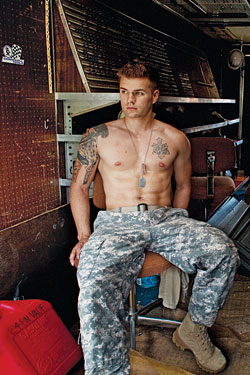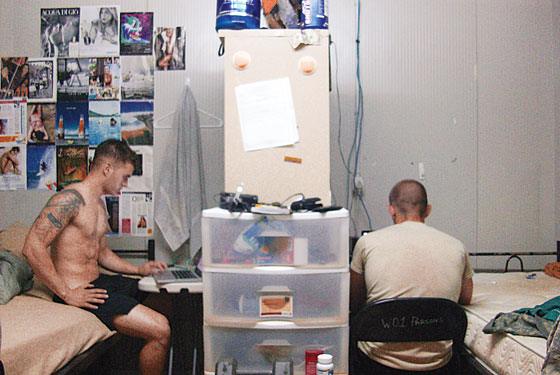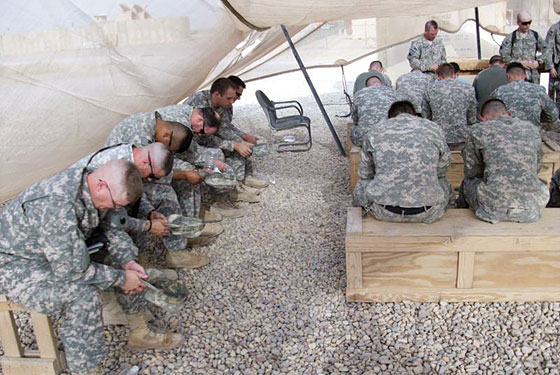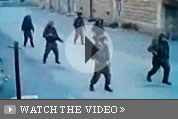
Inside an armored truck are two soldiers. Soldier One is reading a missive against the steering wheel and yells, “What?!”
“What’s wrong?” asks Soldier Two, smiling because he can’t help it.
“Gays, man! Gays in the military. It’s all right to be gay in the military?”
And then a club song kicks in. A soldier unzips his uniform. A shirtless boy dances in the distance atop a military vehicle. The music-video subtitle: “If the Army Goes Gay.” A Codey Wilson Production.
A few months ago, when the U.S. military was in the midst of discussions about repealing its “don’t ask, don’t tell” policy, 22-year-old specialist Wilson took his JVC camera and filmed some of the guys in his company—a troop of National Guardsmen from Virginia on a city-size base in Iraq—dancing to Ke$ha’s
The video is a spoof of what would happen if soldiers were allowed to identify as openly homosexual. There is a shower scene and a night scene with glow sticks and a scene with a kid in a gas mask dry-humping another soldier. There are serious-looking Army guys in T-shirts that are knotted up at the waist to expose their bellybuttons.
Wilson posted the video around 5 p.m. on May 10, and at 2 a.m. the other guys were banging on his door and they came in shouting about how many people had seen it. Holy crap, there were 54,000 views. “We felt like heroes,” he says. “It was the coolest feeling.” Wilson heard a rumor that the Pentagon had to brief President Obama on the video, and while the president was watching it, he is said to have laughed “his ass off.”
But Wilson’s more immediate higher-ups weren’t laughing. They told him to take it down, son. He had to draft a letter explaining himself. He was investigated and put on garbage duty.
By the time Wilson removed the video on the evening of the second day, it had received almost 200,000 views. The Huffington Post and Perez Hilton and NBC and others had posted the link on their sites. The commentary was wide-ranging: Some people thought it was funny, some thought it was sexy. Then there were the people who thought it was nearly blasphemous. What the hell are these boys doing, wasting our tax dollars making silly videos? They are supposed to be fighting a war. And what was it supposed to mean? Was it for or against a change in policy? There was no way of knowing. Politics wasn’t the point.
This was a different sort of reality television. The boy in Wilson’s video at 37 seconds in, the boy at 48 seconds in. They are deployed in Iraq; at this very moment, they are driving tanks up and down the hell roads that lead to Baghdad, where, more often than is advertised, a kid is killed by a roadside bomb. The boy at 37 seconds in could be dead tomorrow, and the video would take on that cobweb lens, the dreamy freeze-frame of what once was.
Wilson’s video did not appear in isolation. A few weeks before he uploaded “Blah Blah Blah,” a troop of soldiers in Afghanistan spoofed Lady Gaga’s
These videos are revealing a new breed of soldier: rebellious, witty, rabid consumers of pop culture, thousands of miles from home but able to Skype daily with family and friends. They are as plugged in as lab rats. When they are not on patrol, they live on the web. They are there and here at once. In Iraq, there are long, stretching days and lonely nights when the guys don’t come out of their rooms unless the Internet is down or an alarm sounds and the base is in trouble. They get gray inside waiting for time to pass, downloading songs and doing pull-ups and growing larger, their arms, chests, jaws. But the making of the video was a reason to come outside, to wield glow sticks, to show off their gym bodies, to have fun. “They don’t pay us,” Wilson says, “to be miserable out here.”
Specialist Wilson wants to be a director. Like Michael Bay, he wants to film big movies with explosions. He is smallish but built, and he’s got the sort of waggish face that the girls in high school went crazy for. He has spiky boy-band hair and white teeth and he has never smoked a cigarette. He curses like a kid, but when he steps into his grandmother’s house, it’s shoot instead of shit and the sunglasses come off in deference.

He is from Lynchburg, Virginia, which has a main drag that goes quiet after 5 p.m. He and his friends call it the City of Churches. When Wilson was home on leave after the video came out, he took his grandmother to their church—the Jerry Falwell–founded Thomas Road Baptist Church, which looks like a movie theater with big-screen televisions and a projection wall and theater seats and a giant imperial choir. During a hymn, she slid Romans, chapter one—which warns against those who rebel against God—onto his lap, and Wilson said, “Jeez, Grandma, are you accusing your grandson of being gay?”
Today is one of Wilson’s last days of leave before he ships out, back to Iraq via Atlanta via Kuwait, where the boys switch from commercial planes to military planes and it’s a whole crew of camo kids loading themselves in like gear. He’s driving through Lynchburg in his welcome-home present to himself, a black 2010 Mazda6, and he has the air-conditioning cold and high. In Iraq, it was dry-death hot, and here in Lynchburg a few days after Memorial Day, it is wet-dirt hot. Wilson drives by his college, Liberty University, which is attached to his private high school, Liberty Christian Academy. He points to the high school, which is dwarfed by a planetary football field, and says, “You get fined if you have a picture holding a drink on Facebook. It’s that kind of place.”
They are rabid consumers of pop culture. when they are not on patrol, They live on the web. They are there and here at once.
He graduated in 2006 and couldn’t wait to get to college. But in his junior year at the academy, he let himself get recruited. “My recruiter was a genius,” he says. A lot of the soldiers paint their recruiters as highly intelligent men who read their brains and knew exactly what to say. Wilson was 17 years old and the kind of kid who was trying to wrap anomalous muscles around a small-boy body. “He saw my ego glowing. He said, ‘Boy, did you know you could go to boot camp while you are still in high school?’ I was like, ‘What?! You can? How many other people do it?’ He goes, ‘Almost nobody!’ ”
So Wilson signed up for the National Guard, partly for the money (a $6,000 bonus plus tuition for school) but mostly because he was flattered to be asked. He has been deployed twice: a year the first time, and it will be eight months when he comes home for the last time, in August. In Iraq, he is in the communications department. He is also often the gunner when they do convoy missions across the country.
The last night before he ships out again, all of Wilson’s friends and some ex-girlfriends and maybe a prospect or two have gathered at Buffalo Wild Wings off Route 460 near the Lynchburg airport. It’s a big hall of a restaurant, and there’s a southern band playing and two big tables full of his friends eating 45-cent wings and drinking Blue Motorcycles, which contain all the clear alcohols plus tequila and blue Curaçao.
Here is Mike, who is in Wilson’s company in Iraq. They hang out in one another’s chu’s a lot. (That’s Containerized Housing Units.) There are two to three boys in each. They have their beds and their laptops and their mini-fridges and their huge tubs of strawberry protein powder and their DVDs and their iPods. Music, they all say, saves them. They talk about stuff going on at home, but mostly they don’t. Girls, family. “It’s easier,” says Mike, “when you don’t think about what you’re missing.”
Wilson’s friend Amy Richardson is a combat medic, 22 years old. When she’s home in Lynchburg working retail for American Eagle, that’s when she’s lonely, she says. She thrills to being in the field. “You don’t need to know the person you’re walking beside,” she says, “but you know they’ll give their life up for you, and you would die for them.” That makes her feel the opposite of lonely.
All of Wilson’s civilian friends think he’s doing something honorable. But Wilson just wants to be done with it, so he can make the rest of his life happen. He is ambitious and understands there is more than one way to get to the place you want to end up. One is to pick a controversial subject and spoof it on YouTube.
A few weeks later, back in Iraq, it is just after the Fourth of July. In Lynchburg, there were barbecues, red and white and blue Jell-O shots, beach volleyball and flip cup and hot dogs and music and green grass. In Iraq, it is hot and red—110 degrees and there is never a cloud in the sky so it’s like you are constantly on display, a naked totem of flesh sticking out of a wide-lens panorama of sand.

In Wilson’s neck of the base, he hangs out with Mike, who says he misses green grass today, more so even than drinking; Fontane, who misses freedom; Moses, who misses his shower; Rampage, who misses the daughter he hasn’t met; and Wilson’s roommate Ramen, who is so called because his family sends him stockades of ramen noodles, in beef and chicken flavors, and it is all he eats every day. Shirtless and kneeling before his microwave, he assembles ramen burritos—he drains the noodles and rolls them up in a tortilla—when everyone else leaves for the dining facility.
Fontane says he joined the Army for self-improvement. He is 31 and almost has his bachelor’s degree, and this is because of the Army. It gives you focus and a schedule, and it pays for school. Rampage joined up to honor his late brother, who was also in the National Guard. Also the money. A lot of the soldiers join for college money. Ramen signed up because “a recruiter came along with a $20,000 check.”
None of these guys joined to kill the enemy. “That’s all the Marines,” says Moses. “Or the Rangers. That’s active duty. Nobody who joins the Reserves says, ‘I’m gonna go join the Guard one weekend a month and whup some ass.’ ”
And yet here they are in Iraq, if not trying to whup some ass then trying, at least, to keep from getting their asses whupped.
Folks back home have the perception that the soldiers in Iraq are twiddling their useless thumbs, says Wilson. They are no longer the subject of war articles and war books and war movies, and their slain and armless and legless are no longer on the front page of the New York Times. “Yeah, Afghanistan is worse,” he says. “But people think that’s where the real fighters are, and the guys over here … we’re just hangin’ out. It’s not like that. There are still people dying.” Another guy says, “The brigade we’re attached to lost four people in the last few months,” and Wilson tells him to hush up, they’re not supposed to give statistics. Wilson says, “People are still dying off. Afghanistan is definitely scarier in most ways, but Iraq is a different war. It’s worse because nothing changes, we’re doing the same thing we’ve been doing for the past two years, it’s just different soldiers doing the same things other soldiers were doing a few months ago.”
On this day in July, Wilson and Rampage and Fontane and Moses and Mike are in Wilson and Ramen’s chu on the base that is built around some old Iraqi bunkers that the U.S. Army overtook. They’re talking about Lindsay Lohan going to jail, because she has just been handed her sentence. They get their news from Yahoo and the like. The print magazines they are sent, says Wilson, consist of “every tool-bag muscle magazine and every kind of weapons magazine that exists.” The Army, it seems, does not know who these boys are, not the way that Facebook does, with their macros up in everybody’s engines so they can deliver heat-seeking ads.
About Lohan, Fontane says, “When I saw her on the news, crying in the courtroom … shit. If it was me back home, if I’d gotten consecutive DUIs, I would’ve been locked up long ago. I mean, the fact that she’s crying about 90 days … ” Fontane has been in Iraq for hundreds of days.
Iraq is scorched, says Wilson. That is the best word. It’s dusty. Your ankles get tough from kicking and slipping on rocks all day long. It’s so hot that your sweat evaporates in direct sunlight. So hot you don’t sweat.
This week, it’s so hot that they can’t stand to eat carbs. Ramen has laid off the ramen in favor of fruits and vegetables. It is too hot, in fact, for underwear. The boys just powder up. Wilson dreams of having a mesh window on the rear of his pants between his legs and his butt so that the skin down there can breathe.
Having a better job shows on the body. Some of the combat guys are shriveled and small, but the supply guys—who get the most time at the gym—are huge and beautiful. “Combat in Iraq,” says Wilson, “has come to mean riding around in a truck for four days or more at a time.” The soldiers pound energy drinks and Honey Buns to stay awake and alert.
Up north, there is a big base that they convoy to. They call it Mount Olympus. It has an enormous swimming pool, and roasting around it is a meat locker of Air Force and Navy troops. In their farmers’ tans, Wilson and the rest of the combat guys look like small pale potatoes from the Midwest.
At Mount Olympus, the girls “aren’t scary, which is the equivalent to being pretty over here,” says Wilson. Because he is in an infantry unit, there are zero women in his battalion. When they do see girls, Wilson says, they’re so rare, like crested ibises coasting around the desert, that in the red-brown light of Iraq, they all look like paradise. And they act like it. The guys want to say, “Baby, you may be a ten here, but when we get home you’ll go back to being a two.”
When he was recruited, his mother made him choose the communications department. She knew he was wild, and she wanted him in an office, out of harm’s way as much as possible. Little could she know that modern warfare doesn’t always spare the desk jockeys.
In Iraq, the gossip is “Did you hear so-and-so lost his arm in the truck accident?”
About once a week, their trucks will get tagged, which is another way of saying hit, by IEDs—improvised explosive devices, such as roadside bombs. Thankfully, Wilson says, their armor is so damn good.
An e-mail from Wilson a few days ago: “We got attacked today and these mothers mortared the gym! My precious gym!” Six guys are injured, but nobody died. A mortar attack sounds like a light whistle that gets ever louder as it gets deathly closer.
Here on a top bunk, there is a boy in glasses and a dog collar. He is half-naked, maybe fully naked, and his torso is large and white beside the blue sheets.
“How you got pimples on your chest, man?” says a black guy from the floor.
The collared kid says they’re scars.
“Scars?”
“Yeah, scars of pimples.”
The other guys in the room—reading, standing, getting ready for bed—laugh. The collared kid is laughing most of all. He knows he deserves to be teased. Aside from a stuffed Pikachu with whom it is alleged that he has a special relationship, he is a 24-year-old virgin.
Someone else says, “Shit, are you naked or something?”
They are laughing and screwing around, but then there is a red fire burning across a dark war sky and you remember, this is not a college dorm.
“I’m not naked!” says the dog-collared kid and he begins to lift off the blue sheets to prove it and the room goes wild. Heads bury into pillows, they laugh and tell him to stop, pull the sheets back up, man!
Nobody in Wilson’s “If the Army Goes Gay” video is actually gay, even though that’s the part that a lot of people got stuck on. He says he’d be shocked (shocked, not upset, he is careful to say) if he found out there were any gay guys in his unit. “They’re all from Virginia, where we have a lot of straight arrows.”
Wilson says there are homophobes on the base, “backcountry rednecks” whom Wilson makes fun of, but mostly makes fun with, because that is how you get across the sand. There were guys in the company who thought Wilson was disrespecting the unit or speaking out in favor of the repeal. “I was also getting gay jokes for a while, but I have kind of a reputation at home—I’ve had like 50 girlfriends—so let people make jokes.”
The thing they seem most concerned about is that the repeal will usher in a slew of new rules about fraternization. “If everyone knows you’re gay and you touch someone, even as a joke, you’ll be going down for it, the same way that if a guy held a girl’s hand on the—Stop it, man! My roommate’s touching me right now.”
These kids don’t have politics—or not the kind you’d recognize back home. They made the video, says Wilson, because they want to be part of the conversation. They watch Lady Gaga videos from their warm blue laptops thousands of miles away, they download current music and post items on Facebook about caches of puppies they find inside of old bunkers. More than anything it says about gays in the military, the message is, Hey, we’re still here.
“The most special thing about the video I made,” says Wilson, “is that for a few days, we kind of became members of society. It was like we actually mattered.”
Everyone gets depressed at some point in Iraq, he says. The word depressed comes out of his mouth pretty often, actually. These boys are different from soldiers that came before, savvier in a sense, mostly because they are more in tune with what they’re missing. Iraq is like Narnia, minutes are hours and you have plenty of time to watch the world move past you. Time happens faster back home. People become celebrities overnight. Girlfriends move on in an afternoon. You can see it all happening in real time on the computer screen.
“Relationships don’t survive this stuff,” says Wilson. A friend of his opened a letter from his fiancée, and the engagement ring fell out. A few days later, Wilson had to console Ramen after he found out his fiancée was cheating on him. “We’ve got young kids in our area preparing for a divorce. People have gotten used to soldiers being away. They just see us as a temporary person now.”
A few weeks ago, the girl Wilson was seeing broke it off with him, saying she needed to be free. A friend and fellow soldier posted on Facebook in solidarity: “Gone are the days of WW2 when girls waited weeks for letters and held onto every word and sentiment.”
Wilson has started making episodic snapshots of life on the base, documenting how things look from out on the sand (to watch them, go here). In one video he’s made, you can see the fuzzy darkness of Hip-Hop Night. A dark concrete room with a bunch of boys dancing without any beer and with very few girls. The video cuts to the 24-year-old virgin, being interrogated by Wilson about the erotic food visuals he employs during masturbation. Wilson says, “So, at some point you thought about pizza and … ” They’re laughing and screwing around, and they just look like regular kids. But then there is a red fire burning across the dark war sky and they ask each other if they’ve been attacked and you remember, this is not a college dorm.
His follow-up to “If the Army Goes Gay” will be a “really sexual and violent and risqué video calendar,” which he says will give “all the muscular guys in my unit a chance to take their shirts off again.” He also plans to produce an actual calendar you can download to your desktop. “I’m going to drop this next one a week before we ship out. By the time everyone gets enraged, I’ll hopefully be on a plane back home.”
Wilson is supposed to come home on August 12, part of the plan to drawdown to 50,000 troops in Iraq by the end of August and end the combat mission there.
He is looking through the blue window of his computer at the faster, greener world on the other side. “We’re ready,” he says, “to merge back into society.”
On the other end of the line, there is a faint clicking. Wilson apologizes, explaining that he is packing up. It is the sound of unloading ammunition.



